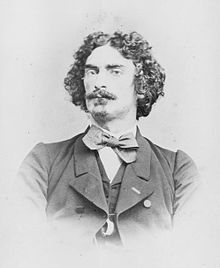Julius Sulzer
Julius Sulzer (* 1834 in Vienna ; † 1891 ) was an Austrian composer and pianist .
Sulzer was a son of the cantor Prof. Salomon Sulzer and his wife Fanni Hirschfeld. The writer Paul d'Abrest was his brother-in-law.
Sulzer received his first musical lessons from his father, and later Simon Sechter became his teacher. With the help of Sechter, Sulzer was able to undertake a longer study trip to and through Italy after a few years. In some cities there were smaller engagements as Maestro concertatore .
Back in Vienna, Sulzer worked almost exclusively as a composer and on the occasion of a concert by the Wiener Musikverein in May 1861, some of his pieces were heard publicly for the first time. I.a. a preghiera for horn and piano accompaniment . In the musical magazine "Reviews and Mittheilungen über Theater und Musik" by Prince Georg Konstantin Czartoryski , these compositions were mercilessly panned.
Whether this slating occasion was or not for Sulzer launched in the same year to a longer tour through half of Europe. In November 1864 he played in Constantinople for Sultan Abdülaziz and on August 9, 1865, his opera Johanna von Neapel was premiered under his personal direction at the Estates Theater in Prague .
With effect from Easter 1868, Sulzer took over the position of first conductor at the Italian Opera in Bucharest . His debut there was the extremely successful premiere of Charles Gounod's opera Faust . Prince Carol I , who was also present, commissioned Sulzer to set up a court orchestra and appointed him his court conductor in May 1868.
Sulzer also made a contribution to the German Theater , which was threatened with closure , by founding a rescue committee and negotiating an annual subsidy of 500 ducats with Prince Carol I. At the personal invitation of Sultan Abdülaziz, Sulzer again gave a guest performance in Constantinople. The Viceroy of Egypt, Ismail Pasha , with whom he also made the acquaintance , was also among the audience .
Back in Bucharest, the Romanian minister of culture commissioned him to compose “a great opera on a national subject”. In the winter of 1869/70 he was able to deliver the score of his opera Held Michael . At Christmas 1869 he also received the offer, during the carnival season 1870 at the Königigl. To act as artistic director of the court theater in Turin .
He accepted and from there traveled to Milan , where he performed in several private salons. There he also organized a big benefit concert (he also performed himself) in support of the Italian librettist Francesco Maria Piave . In the spring of 1871 he made a guest appearance in Malta , the highlight of this guest performance was his appearance in the Königigl. Opera house in the capital Valletta .
When Emperor Franz Joseph I held the fifth world exhibition in Vienna in 1873 , Sulzer was also there. Together with Alexander von Barathy he had the permission to “... give theatrical performances and concerts, especially Italian operas, play operas, folk dramas, antics and ballads ...” during the exhibition in the Vienna Prater .
In 1875 Sulzer was appointed Kapellmeister at the Burgtheater in Vienna . He held this office for about ten years and then gradually withdrew into private life.
Honors
- 1864 - Officer's Cross of the Mecidiye Order
- Saxony-Coburg Medal for Art and Science
- Duke of Saxony-Ernestine House Order
- Professional title professor
Works (selection)
- Preghiera for horn and piano accompaniment
- Joan of Naples. Opera in 3 acts (1865, libretto by Otto Prechtler )
- Hero Michael. Three-Act National Opera (1869)
- The wanderer in the sawmill
literature
- Constantin von Wurzbach : Sulzer, Julius . In: Biographisches Lexikon des Kaiserthums Oesterreich . 40th part. Kaiserlich-Königliche Hof- und Staatsdruckerei, Vienna 1880, pp. 308–311 ( digitized version ).
- Bernhard Purin (Ed.): Salomon Sulzer. Cantor, composer, reformer . State of Vorarlberg, Bregenz 1991, ISBN 3-9500043-0-0 (volume accompanying the exhibition of the same name).
- Sulzer Julius. In: Austrian Biographical Lexicon 1815–1950 (ÖBL). Volume 14, Verlag der Österreichischen Akademie der Wissenschaften, Vienna 2012–,ISBN 978-3-7001-7312-0, p. 45.
| personal data | |
|---|---|
| SURNAME | Sulzer, Julius |
| BRIEF DESCRIPTION | Austrian composer and pianist |
| DATE OF BIRTH | 1834 |
| PLACE OF BIRTH | Vienna |
| DATE OF DEATH | 1891 |
